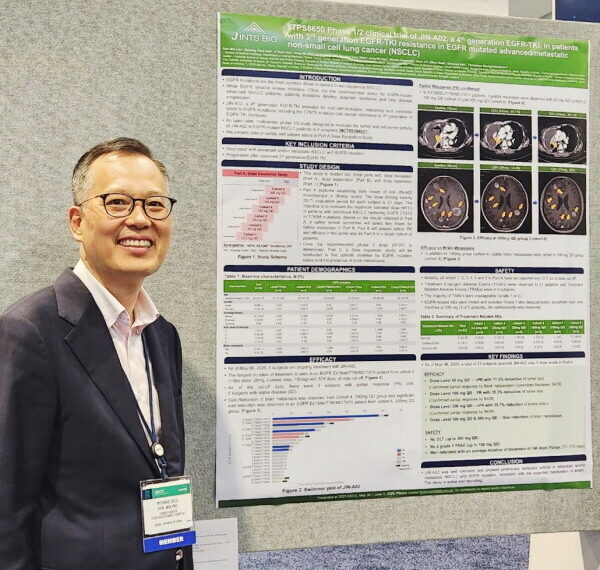Significant anti-tumor responses and reduction of brain metastases observed
SEOUL, South Korea , June 2, 2025 /PRNewswire/ — J INTS BIO, a company specializing in the development of therapeutics for cancer and rare diseases, officially announced interim results from the global Phase 1/2 clinical trial of JIN-A02, its fourth-generation EGFR-TKI drug candidate, at the American Society of Clinical Oncology 2025 (ASCO 2025), the world’s largest oncology conference, held in Chicago, USA.

Professor Byoung Chul Cho from Yonsei Cancer Center, posing with the JIN-A02 poster at the ASCO 2025 (Photo=J INTS BIO)
JIN-A02 is an oral, fourth-generation EGFR-TKI designed to overcome resistance mutations (such as C797S) that develop after treatment failure with third-generation EGFR-TKIs, which are currently the first-line therapy for EGFR-mutant Non-small cell lung cancer (NSCLC). It is currently undergoing clinical trials in South Korea, the United States, Thailand, and other countries. Key efficacy and safety results from Part A (dose escalation) of the multi-center clinical trial (NCT05394831) were presented.
‘Confirmed’ clinical response observed in patients with disease progression after 3rd Generation EGFR TKI and chemotherapy
One of the key findings of the ASCO presentation was that tumor responses were sustained in specific dose cohorts, with confirmed partial responses (PRs) verified by independent evaluation. Confirmed PRs were observed in 50mg,100mg and 300mg QD dose groups, providing clinical evidence of anti-tumor activity.
In the 50 mg dose group, patients achieved a 77.3% reduction in tumor size, maintaining a PR over six consecutive treatment cycles (from cycle 3 to cycle 13). In the 300 mg dose group, a confirmed PR was observed with a 39.7% tumor size reduction, including a significant reduction in brain metastatic lesions. In the 100 mg dose group, a PR was also reported with a 35.3% reduction in tumor size, and brain metastatic lesions remained stable, further supporting the potential of JIN-A02 in treating brain metastases.
Safety confirmed up to 300 mg, with therapeutic signals in brain metastases
No dose-limiting toxicities (DLTs) or serious adverse events were observed with JIN-A02 at doses up to 300mg, which is six times the dose level when PR was first observed, demonstrating a favorable safety profile even at higher dose levels. The majority of adverse events reported at 300mg were mild (Grade 1-2) and included for the first time, Grade 1 skin rash, diarrhea, and skin desquamation in 3 out of 5 subjects – events commonly associated with EGFR inhibitors and generally considered clinically manageable. Importantly, there were no reports of systemic toxicities such as cardiovascular events or hepatotoxicity, supporting the drug’s excellent safety profile. This safety and tolerability have translated into extended treatment durations in real-world settings, with a patient still on JIN-A02 after one year and seven months.
In addition, the trial demonstrated notable responses in brain metastases first noted at 100mg, suggesting that JIN-A02 achieves therapeutically relevant concentrations in brain tissue.
JIN-A02 gains national spotlight as government grants accelerate development
In addition to the ASCO announcement, J INTS BIO continues to achieve noteworthy results in Korea. Recently, it was selected for the ‘2025 Baby Unicorn Fostering Project’ by the Ministry of SMEs and Startups, officially recognizing both our scientific technology and commercialization potential. The ‘Baby Unicorn Fostering Project’ is a government project that focuses on developing promising startups with innovative technologies and growth potential in the global market as ‘potential unicorns’. Companies selected for this project will receive full government support in recognition of their technological prowess and growth potential.
With these accolades, JIN-A02 will receive dual funding for its Phase 2 trial and global expansion over the next two years, which is expected to be a decisive point to significantly accelerate the pace of clinical and commercialization in parallel with private investment. It is also significant as a case of securing confidence in the 3 arena of technology, marketability, and global scalability, as the recognition came from different government departments.
Based on these achievements, we plan to initiate the Phase 2 clinical trial of JIN-A02 in before the end of this year, in discussions with the US FDA.
“The ASCO presentation of JIN-A02’s ability to induce anti-cancer responses and its ability to respond to central nervous system metastatic lesions is of great significance,” said Dr. Anna Jo, CEO. “The government’s continued support is a recognition of our technical capabilities and potential for growth. We will take advantage of this opportunity to accelerate global clinical expansion, technology transfer, and indication expansion to realize our goal of early commercialization”





